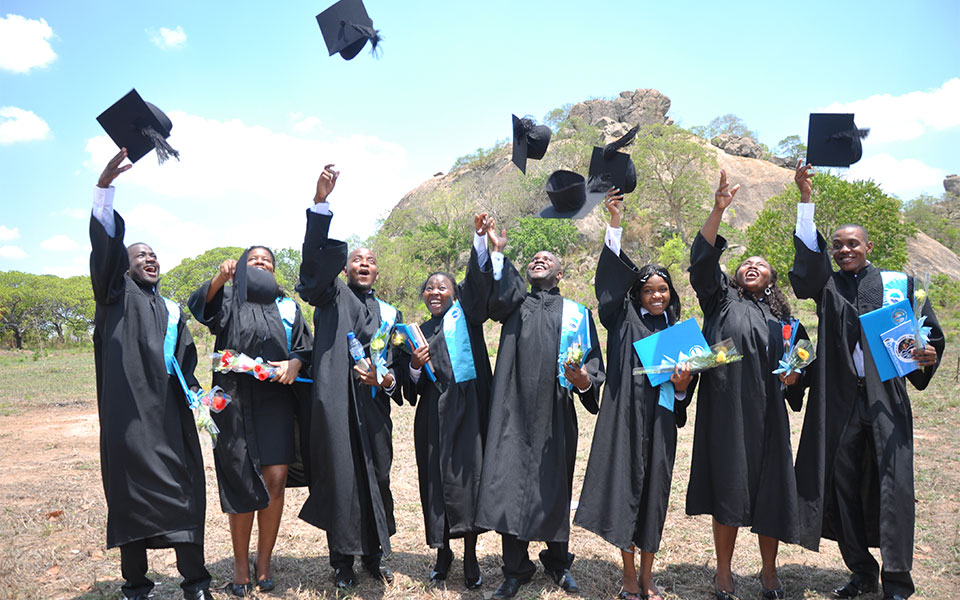- OT
- Life in practice
- Career development
- First of a kind
How I got here
First of a kind
Optometrist, Joel Bambamba, was one of the first optometrists to qualify in Mozambique. He shares his journey to qualification and beyond with OT

26 March 2018
My first experience with optics was amazing.
Through my studies I have learned to understand the many aspects of vision science; how the eye works, what it actually means to ‘not see well’ and to be able to explain this to my patients. I would have never had the opportunity to undertake this journey without Mozambique receiving international support and guidance from the Brien Holden Vision Institute, the Dublin Institute of Technology, University of Ulster, Optometry Giving Sight and the others in Mozambique Eyecare Project, so I am very grateful.
I wanted to become an optometrist because I have a history of blindness and severe eye problems in my family.
My grandfather was blind and my brother has suffered from keratoconus since his childhood. I come from a small town in Mozambique in Southern Africa where there are no eye care services. My mother had to travel 400km with my brother for an appointment with an eye care professional.
Optics was a difficult journey to begin with, but my family history of eye troubles and blindness was definitely an extra motivation.
I started my tertiary study into nutrition, but it was not the challenge that I was searching for. That’s why I decided to switch to optometry. I wanted to explore my intellectual capacities, plus I had a genuine desire to really help people.
Optometry was a very challenging subject to study. At the start I had absolutely no knowledge about optometry at all.
In Mozambique, it is a new profession and when I started studying my degree in 2009, I was in the first cohort of students accepted onto the optometry degree.
"Optics was a difficult journey to begin with, but my family history of eye troubles and blindness was definitely an extra motivation"
I feel grateful to have been one of the first optometrists in Mozambique.
It is a very unique position. Now I wish to keep learning, gaining progressive skills and I want more than anything to be able to do great things in eye care for my small town and, in the bigger picture across Mozambique.
After I qualified as an optometrist I kept studying and working as I knew it was up to myself and my fellow graduate optometrists to move ahead and become part of the faculty.
I could see, with the guidance of Brien Holden Vision Institute and others, that to continue to study was really important to help establish the optometry profession in my country.
With financial support from the Jill and George Mertz Fellowship from the American Optometric Foundation, I was accepted for a fellowship in the InterAmerican University of Porto Rico’s School of Optometry as part of a faculty department programme for the Mozambique Eyecare Program.
I am now a lecturer at Universidade Lúrio where I work as the department head. I am still continuing my study and I hope to complete a Doctorate in health care strategic management with focus on eye health research.

Practising in Mozambique can be challenging at times in both the hospital setting and in the private sector, but for different reasons.
In the hospitals, there are often many restrictions around working with ophthalmologists. Optometry is a very new profession and acceptance will take time. In the private sector, practicing as an optometrist can be difficult because the lack of equipment suppliers and the barriers around starting a private practice.
The most rewarding aspect of my job is seeing the faces of my students discovering and understanding the visual system.
It feels great to be part of the staff who have contributed to enhance eye care in Mozambique by assisting the graduation of more qualified professionals.
A career highlight so far has been becoming a faculty course director, which is part of my role heading up the optometry department.
However, there have been many others, such as being made a country representative by the Universidade Lúrio for some international development projects, which helped to build my personality and opened my mind in different ways and for different health matters.
Have your say on our community forums
From accountants and electrical engineers, to fitness instructors and stylists, there are many pathways of possibility when it comes to picking your career. Share what made you want to be an optometrist on the AOP’s community forums?
In terms of my next steps in my career, I applied for a post-graduate programme in community eye health at Cape Town University and was accepted with a full scholarship.
I intend to finish my Doctorate in health care strategic development, and then start a Master’s in neurophthalmology, which has been a dream of mine since I started optometry.
I also have an eye on starting a degree in electrical engineering.
My long-term view is that things are changing in Mozambique. Many health care professionals are graduating and in the medical sector technology is leaping forward. The public sector has a limited scope of positions to absorb the capacity of qualified professionals, so private practice will see massive growth in a few years’ time. Both sectors will need greater availability of equipment – something that is scarce in our country at this present time.
Plan B
I think I would lean towards becoming an electrical engineer, but right now I am committed to optometry.
Advertisement


Comments (0)
You must be logged in to join the discussion. Log in